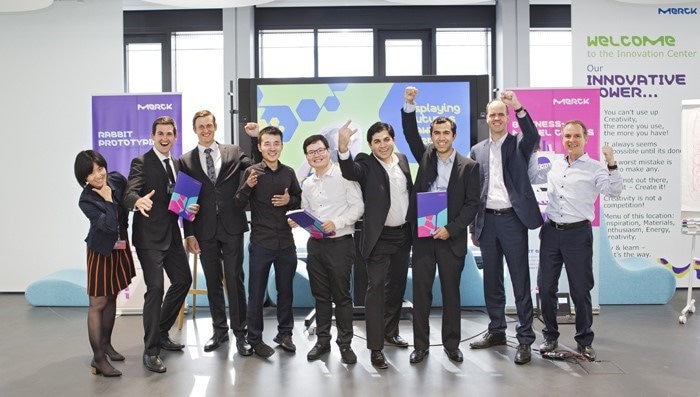Open innovation: Researching in isolation is a thing of the past
Publish Date
23 JAN 2018
Overview
Digitalization creates networks. Networks accelerate the dissemination of knowledge. Thanks to the Internet, expertise can be distributed around the entire world in a matter of seconds.
And yet, as businesses, we shouldn’t shy away from this increase in speed and openness – in fact, we should do just the opposite. As always, there are two ways of looking at this. On the one hand, digital networks increase the pressure on companies to innovate. At the same time, however, digitalization also offers huge opportunities for companies to increase their own capacity to innovate through new forms of collaboration, such as the future world of work. Our development teams no longer work in one location. Instead, they are connected around the world.
Moreover, Merck KGaA, Darmstadt, Germany is harnessing the openness of the digital world. Our company has opened up its innovation processes to the outside world where it makes sense to do so, in order to benefit from the creative ideas of people outside the company. Open innovation is becoming increasingly important.
Breaking out of your bubble
The fundamental principle behind open innovation is that innovations do not necessarily arise where they will later be used. To encourage creative thinking, innovation should be initiated outside established routines and in interdisciplinary teams. That said, open innovation is not a one-way street. To maximize the potential for innovation, companies cannot be allowed to simply absorb knowledge from external sources, but instead must be prepared to share their own knowledge.
At Merck KGaA, Darmstadt, Germany, we know that we will not always discover the best ways to tackle the technological and scientific challenges of our time by working in isolation, which is why we’ve anchored open innovation firmly in our corporate culture. Our research and development teams are open to external input and work closely with companies, scientists and students from across the globe and beyond the confines of our laboratories. This is how we bring external partners’ ideas into our development portfolio and, in turn, provide our expertise for external projects.
Support from the start
Adopting a targeted approach to developing innovative ideas is one crucial way in which we benefit from external knowledge. For instance, our “Open Innovation Portal” and our Hackathons give students the opportunity to develop global networks and implement their own business ideas. We provide young people with the experience of our industry experts, the use of our labs and financial support to help them put their ideas into practice and develop new technologies.
This is a win-win situation: Our partners often have outstanding ideas but may lack the knowledge, infrastructure or financing to create a viable product. And this is where we step in, providing market knowledge, laboratories and production sites, and the financial clout of a DAX company.
At the annual Displaying Futures Award, Merck KGaA, Darmstadt, Germany provides targeted support to scientists and young entrepreneurs who are undertaking research into technologies that are closely aligned with our Electronics business. Participants are given exclusive access to our technological and business expertise to enable them to implement their projects. The most innovative research projects receive an award of US$ 50,000.
I am particularly pleased to report that some of the projects that benefited from our funding initiatives have now developed into healthy, independent start-ups. One such example is the Canadian start-up Flosonics Medical, which received one of the Displaying Futures Awards in 2017 for FloPatch, a disposable bandage incorporating ultrasound technology. FloPatch allows blood flow to be measured in real-time, and the efficacy of emergency procedures, such as cardiopulmonary resuscitation, can be evaluated in just a few seconds.
Accelerating Promising Developments
However, Merck KGaA, Darmstadt, Germany doesn’t just give assistance to projects that are still in their infancy; we also provide targeted support to new start-ups that have already developed groundbreaking innovations. Our Accelerator program plays a crucial role in this. The program is run by our Innovation Center and supports start-ups working in our business areas. The program provides individual coaching to young entrepreneurs in local workshops, access to our facilities and generous financial support as well as the opportunity to join our network of over 50,000 experts and alumni across 67 countries.
Inuru, a start-up from Berlin, took part in the Accelerator program in 2017. The company developed an ink based on organic light-emitting diodes (OLED), which can print light on paper – another technology that is very closed linked to our Electronics. In the future, this innovation will make it possible to display video content on packaging and magazines.
The high number of applicants demonstrates that company founders view the Accelerator program as a real springboard for their businesses. This year, 438 start-ups from 58 countries have applied to take part in our Accelerator program.
We are sharing our expertise and investing time and money, and in return, we benefit from innovations that may have never happened within our company’s established routines. Here at Merck KGaA, Darmstadt, Germany, we understand that companies are not isolated entities but rather open, dynamic systems with permeable borders that allow knowledge to be shared and absorbed.
Only by engaging in continual dialogue with the outside world and by using the huge wealth of available knowledge out there can we compete on the global stage and develop the technologies and products that will bring about lasting improvements to our lives. Here again, digitalization and Work 4.0 provide opportunities, which we should seize in a systematic fashion.

